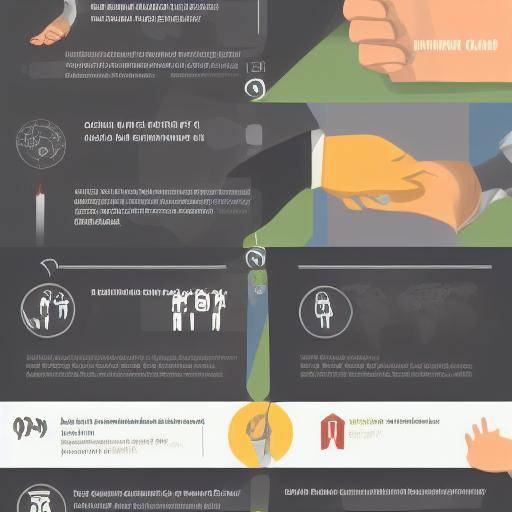
Financial stress is a common concern in modern life. Money problems, overwhelming debts and economic uncertainty can cause havoc on people's physical and emotional health. Identifying and reducing financial stress is crucial to overall well-being. In this article, we will explore practical advice to help you recognize the signs of financial stress and handle it effectively.
Assessment of financial stress
Before dealing with financial stress, it is essential to evaluate how it affects you. The first step is to recognize common symptoms of financial stress, which may include anxiety, insomnia, irritability, depression, and physical health problems. Identify your specific concerns, such as debts, unemployment, retirement planning, or unforeseen expenses.
Recognizing symptoms
Financial stress can manifest in various ways. Pay attention to emotional and physical indicators, such as insomnia, constant fatigue, irritability, lack of concentration, sudden weight loss or increase, and muscle tension. Behavioral signs, such as social isolation, changes in eating or sleep habits, and personal neglect, can also be symptoms of financial stress.
Evaluating the situation
Analyze your financial situation realistically and without judging you. Examine your income, expenses, debts, savings and financial goals. Evaluate how sustainable your current situation is and if you are living above your possibilities.
Search for professional help
If your financial concerns overwhelm you, consider seeking professional help. A financial advisor or therapist can provide guidance and support to manage financial stress.
Control of financial stress
Once you have assessed your financial stress, it is essential to take concrete measures to control it. Financial stress control involves adopting strategies to manage your financial concerns effectively and reducing their impact on your well-being.
Establishment of a realistic budget
Creating a detailed budget allows you to have a clear picture of your income and expenses. Identify areas where you can reduce unnecessary expenses and allocate funds for debt payment and savings.
Debt management
If debts are a significant source of financial stress, it develops a plan to liquidate them. Prioritizes the payment of high-interest debts and considers negotiating with creditors to establish more manageable payment options.
Development of financial skills
Invest time in educating you about personal finance. Learn about investments, savings, retirement planning and strategies to increase your income. Improving your financial literacy will help you make informed decisions and reduce long-term financial stress.
Financial and emotional wellbeing
Financial well-being is closely related to emotional well-being. Focusing on a state of financial well-being means balancing your financial concerns with your mental and emotional health.
Self-care practices
Dedicates time to take care of your emotional well-being. Find activities that give you pleasure and relief, such as exercise, meditation, time with friends and family, or participation in creative pastimes.
Realistic targets established
Setting affordable financial goals helps you stay focused and motivated. Define your short- and long-term goals, and work gradually towards them.
Emotional impact reduction
Recognizes that financial stress can have a significant emotional impact. Learn to manage your emotions, seek emotional support and practice self-compassion.
Conclusion
Reducing financial stress is a gradual process that requires self-assessment, control and focus on integral well-being. By identifying signs of financial stress, taking control of the financial situation and prioritizing emotional well-being, you can significantly improve your quality of life. Remember that seeking professional help and educating yourself on financial issues are valuable steps towards a more stable and healthy future.
Frequently asked questions
What are the common signs of financial stress?
Financial stress can be manifested through emotional, physical and behavioral symptoms. Some common signs include anxiety, insomnia, irritability, fatigue, social isolation, changes in eating habits and personal carelessness.
How can I control financial stress?
Financial stress control involves the development of a realistic budget, debt management, financial skills development and emotional well-being through self-care practices and the establishment of realistic goals.
What is the importance of financial well-being?
Financial well-being is crucial to overall emotional well-being. By balancing your financial concerns with your mental and emotional health, you can improve your quality of life and feel safer and quieter in financial terms.
When should I seek professional help to manage financial stress?
If you feel that financial stress is significantly affecting your daily life, it is important to seek professional help. A financial advisor or therapist can provide guidance and support to effectively manage your financial concerns.
How can I set realistic financial targets?
In establishing financial goals, it is essential to be specific, measurable and attainable. Identify your short, medium and long-term goals, and work incrementally towards your achievement.
What are some effective strategies to reduce long-term financial stress?
Financial education, debt management, the establishment of an emergency fund and retirement planning are effective strategies to reduce long-term financial stress.
In short, identifying and reducing financial stress requires a proactive and balanced approach that encompasses evaluation, control and comprehensive well-being. By adopting healthy financial practices and caring for your emotional well-being, you can improve your relationship with money and enjoy greater tranquility. Remember that every step you take towards managing financial stress is a significant step towards a more balanced and satisfying life.






















































